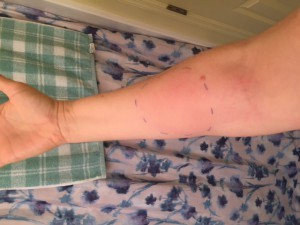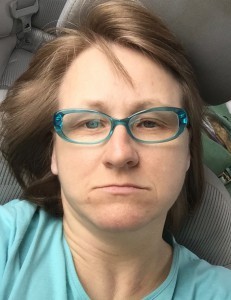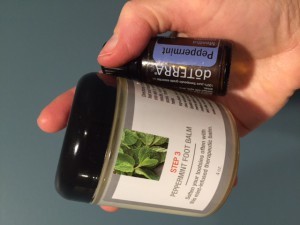I Will Thrive: Whether From Sea Air or LDA or Some Other Method!
I love sharing. Especially when it has the power to help other people.
I’d like to share something I did Tuesday. I drove to Towson, Md., where I received LDA therapy. That stands for low-dose allergen, a type of immunotherapy. I don’t know if it will help, and it may take as long as one year to determine that, but at this point, I’ll try anything.
The blue ring shows my right arm several hours after receiving a LDA shot for chemicals, and the redness was even creeping toward the crease in my arm. Contrast that with my left arm, where I received a shot for cats, mildew, and dust. It grew no bigger than a minor bee string. My doctor says this shows just how much chemicals bother me.
I’ve been sick with MCS (multiple chemical sensitivities) since the late 1980s. Whether from renovating my pre-Civil War childhood home, breathing in dust from decades old varnish and paint as I sanded the floors to remove it, or from the mildew that seeped through the brick walls as I stripped away wallpaper far more ancient than my grandparents, or from succumbing to the wood and coal smoke that snaked through our house, I don’t know. I just know I changed. My children’s pediatrician told me my system had become overloaded with something that changed it, leading to MCS.
For the most part, I coped well. Then, in 2012, something changed: I had been sick with a respiratory illness before attending a friend’s wedding in Mexico. While there, I was overcome with an allergic reaction to the stargazer lilies throughout the reception hall. When I returned home, new commercial grade carpet that had been installed in the stairwell immediately made me gag. I later drove myself to an emergency room in South Charleston on the way home from a book signing when I couldn’t breathe, and ultimately was confined to my couch for a month. There, I took nebulizer treatments four times a day.
Gradually, I became better—enough that I could resume normal activities. But in the last two years, every essence of my senses are set on sharp alert the second I smell fragrance. It doesn’t matter if it’s a friend’s deodorant or a stranger’s aftershave or even the Jovan musk spray I once wore. The hand cream, hand sanitizer (which contains fragrance), or hairspray that a beloved family member has worn (or shampoo she recently used, but can’t smell herself), my symptoms flare up dramatically.
This is a self-portrait, taken on one of my worst days. Need I say more?
They are—trust me when I say—more prominent than any Arabian stallion’s nostrils you’ve ever seen. From there it’s a rapid descent to all the annoying changes my body undergoes: sneezing, itchy throat, swollen lymph nodes, full ears, headache, cough, phlegm, coughing, wheezing, and moodiness, to name a few. With continued exposure to any such toxins, I will have a full-blown sinus or ear infection within one week. Guaranteed. Maybe even bronchitis.
Along the way, I’ve learned to avoid certain public places. And especially public restrooms, from where, I am sure—between the toilet deodorizers, the hand soap, and the wall-mounted commercial unit that puffs out some chemical every time the door opens—we inhale a plethora of toxins. Among the public restrooms I no longer use are those inside Sheetz, Burger King, Dunkin Donuts, Wendy’s, TJ Maxx, and almost all fueling stations and department stores. (Starbucks’ restrooms and most of those inside McDonald’s are manageable.) And don’t get me started on the chemicals I smell the minute I walk into the clothing section of Gabriel Brothers, Target, or Elder-Beerman. Last year I bought a new swimsuit but couldn’t wear it until I washed it five times! And even then, the smell lingered.
All of this to tell you why I’ve spent the better part of the last year researching MCS and any possible treatment for it. (When I wasn’t undergoing bilateral knee surgery or writing my last book.) Some people say there is no treatment, but I no longer believe that. And what I’ve learned is fascinating! For instance, the Centers for Disease Control issued a policy saying its offices are to be fragrance free. This, because scientists now know that fragrance contains toxins. Just because you can’t smell them doesn’t mean they aren’t there. (Which makes me kind of like a canary in a coal mine.)
Until the LDA and sea air help me feel better, there’s always peppermint . . . doTerra to inhale and Lemongrass to rub on my feet. And Lois Foster, who runs Somatic Wellness in Westover, also has a salt room and an infrared sauna, which my new doctor says is amazing for removing toxins from folks with MCS like me!
My research came on the heels of finding a new ENT. He suggested that if the shots for my dust mite allergy and the increased vitamin regimen he recommended didn’t help, I should go see a doctor in Dayton, Ohio, where they treat people for MCS. And that’s how I learned about LDA, which has been around since the 1990s. (Imagine my dismay, when I realized it has “only” taken me 18 years of living with this awful condition to learn about LDA. Why no other doctor ever mentioned it is beyond me!) Especially given that LDA has an 80-percent success rate. (It’s based on the work of a British doctor in the 1960s, then called Enzyme Potentiated Desensitization, or EPD.)
I don’t know if LDA will help, but it certainly cannot hurt! My new doctor says it could take up to one year to find out. He says he’s seen good success with several other families from Morgantown, WV, where I live.
Interestingly, if you’ve had a happy childhood, the treatment is more likely to be a success. However, if you were sexually abused as a child, he says it’s not as easy to treat this condition. Which now makes me wonder if my MCS was triggered—not by the home renovation I carried out—but by my abuser’s love of Irish Spring soap, which he used every single day for the entire time I knew him.
It’s a very interesting question, and one which obviously contains a physiological component. I’ll get back to you on that. Meanwhile, my LDA doctor tells me I should work up a sweat when working out (to help rid the body of toxins), stay hydrated, and use a saline nasal rinse.
I’ll also keep you posted on my progress, since my next dose of LDA comes in two months. Meanwhile, I’m headed to Florida for the southern book tour my readers have patiently awaited since my memoir was released in 2011. That is the primary reason for my trip, but after my Caribbean cruise in January, when I felt better than I have in years, I must admit to being curious about the health benefits someone like me can derive from living by the ocean.
NEXT WEEK . . . I’ll blog about how I set up this upcoming book tour, and how you can do the same in your area or anywhere.
* * * *
My fifth book, Guilt by Matrimony, about the murder of Aspen socialite, Nancy Pfister, was released November 17. My memoir, Sister of Silence, is about surviving domestic violence and how journalism helped free me; Cheatin’ Ain’t Easy, now in ebook format, is about the life of Preston County native, Eloise Morgan Milne; The Savage Murder of Skylar Neese (a New York Times bestseller, with coauthor Geoff Fuller) and Pretty Little Killers (also with Fuller), released July 8, 2014, and featured in the August 18 issue of People Magazine.
You can find these books either online or in print at a bookstore near you, at BenBella Books, Nellie Bly Books, Amazon, on iTunes and Barnes and Noble.
For an in-depth look at the damaging effects of the silence that surrounds abuse, please watch my live TEDx talk, given April 13, 2013, at Connecticut College.
Have a great day and remember, it’s whatever you want to make it!
~Daleen
Editor’s Note: Daleen Berry is a New York Times best-selling author and a recipient of the Pearl Buck Award in Writing for Social Change. She has won several other awards, for investigative journalism and her weekly newspaper columns, and her memoir, Sister of Silence, placed first in the West Virginia Writers’ Competition. Ms. Berry speaks about overcoming abuse through awareness, empowerment and goal attainment at conferences around the country. To read an excerpt of her memoir, please go to the Sister of Silence site. Check out the five-star review from ForeWord Reviews. Or find out why Kirkus Reviews called Ms. Berry “an engaging writer, her style fluid and easy to read, with welcome touches of humor and sustained tension throughout.”
Editor’s Note: Daleen Berry is a New York Times best-selling author and a recipient of the Pearl Buck Award in Writing for Social Change. She has won several other awards, for investigative journalism and her weekly newspaper columns, and her memoir, Sister of Silence, placed first in the West Virginia Writers’ Competition. Ms. Berry speaks about overcoming abuse through awareness, empowerment and goal attainment at conferences around the country. To read an excerpt of her memoir, please go to the Sister of Silence site. Check out the five-star review from ForeWord Reviews. Or find out why Kirkus Reviews called Ms. Berry “an engaging writer, her style fluid and easy to read, with welcome touches of humor and sustained tension throughout.”



